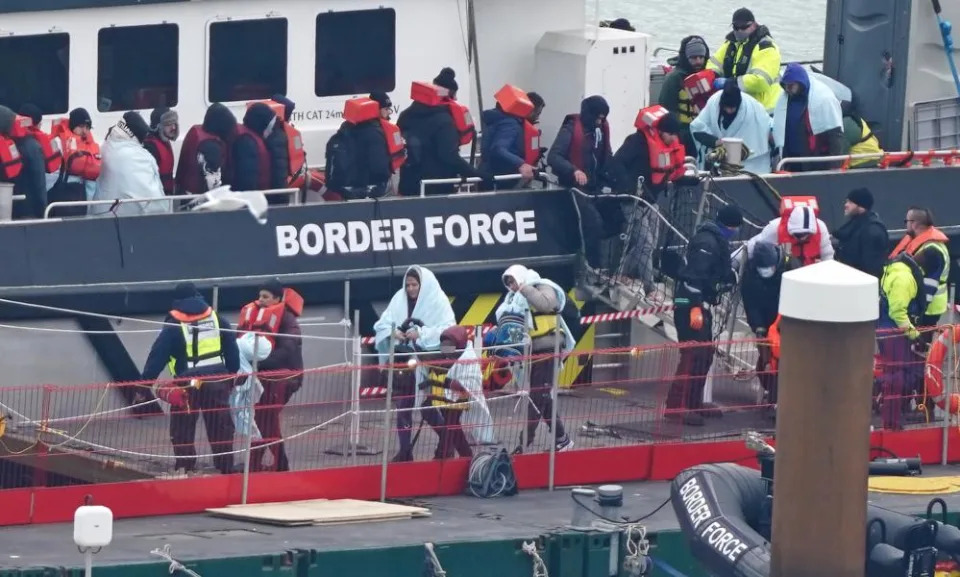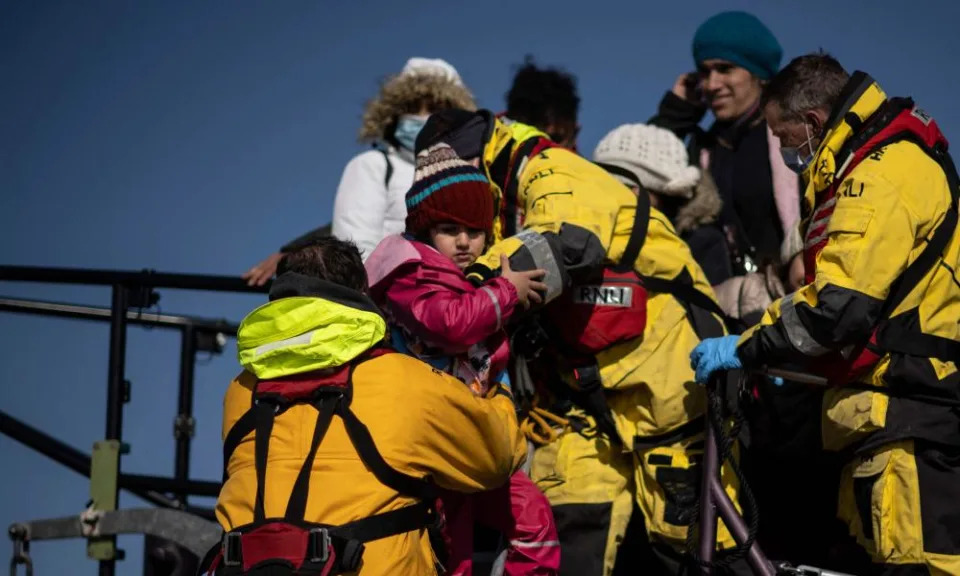UK
Forty-three times the Conservatives tried (and failed) to tackle Channel crossingsArchie Bland
Tue, 7 March 2023

Photograph: Gareth Fuller/PA
On Tuesday, Rishi Sunak and Suella Braverman will announce a new plan to deal with the small boats crisis. But from using the navy to threatening asylum seekers with detention in Moldova to sending jetskis on patrol, the Conservatives have not been short of schemes to deter those who plan to cross the Channel since the issue came to the top of the agenda in the last weeks of 2018. Here’s a guide to some of them.
2019: 1,843 people arrive by small boat crossings
January: Deploy more Border Force ships, work with France
The home secretary, Sajid Javid, promises two extra Border Force cutters to patrol the Channel, bringing the total to five. On a visit to Dover, Javid says: “If you do somehow make it to the UK, we will do everything we can to make sure that you are often not successful.” This will become familiar. Meanwhile, France and the UK agree a coordinated plan to reduce crossings with more French surveillance and security on the coastline. This will also become familiar.
August: Work with France, warn people making the crossing: ‘We will send you back’
Boris Johnson tells those attempting to cross: “We will send you back … If you come illegally, you are an illegal migrant.” Meanwhile, the new home secretary, Priti Patel, holds new talks with her French counterpart.
2020: 8,466 people arrive by small boat crossings
July: Work with France, invest more in border security, create new ‘intelligence cell’
Priti Patel meets the French interior minister, Gérald Darmanin; the pair “reaffirm their shared commitment to returning boats in the Channel to France”. They announce a “joint intelligence cell, which will crack down on the gangs”. A £705m investment in borders before Brexit is announced, including new money for security.
August: Use the navy to force boats back, appoint a new ‘clandestine Channel threat commander’
Patel tells MPs she intends to use the navy to block crossings before boats can enter British waters. A defence official calls the idea “completely potty”, a view it retains 18 months later. She also appoints Dan O’Mahoney as clandestine Channel threat commander, tasking him with making France strengthen enforcement measures.
September: House asylum seekers in barracks, patrol on jet skis, send asylum seekers to Moldova or Papua New Guinea
The local MP Damian Collins reveals that people who have made the crossing will be housed in a former barracks near Folkestone in Kent. Meanwhile, the Home Office sets out plans to buy two jet skis to help with patrols (£). The former Border Force head Tony Smith warns that such plans are “highly dangerous”.
Later in September, the Guardian reveals that plans are under consideration to send asylum seekers to third countries for processing, with options including Moldova, Morocco and Papua New Guinea. This eventually becomes the Rwanda plan. The Home Office is already warning of the “significant” legal, diplomatic and practical obstacles to the idea.
October: Be ‘firm and fair’, stop ‘endless legal claims’
In her party conference speech, Patel says she will make it harder to appeal against asylum decisions and “expedite the removal of those who have no legitimate claim for protection”. She bemoans “decades of inaction by successive governments”.
November: Prosecute asylum seekers for steering dinghies, work with France
It emerges that new Crown Prosecution Service guidance allows asylum seekers to be prosecuted for steering dinghies as they make the crossing, even if they have no links to organised crime groups. Campaigners criticise the government for describing those steering the boats with no financial benefit as “people smugglers”. Meanwhile, the UK and France sign an agreement, agree to double French police patrols on the coastline, and promise to make the crossing unviable.
December: Facebook ads to warn would-be migrants against making the crossing, deny entry to anyone passing through safe third country
O’Mahoney announces a “social media blitz” of ads geo-targeted on the French coastline that will warn people they risk prosecution for steering boats. He says the government is “determined to make this route completely unviable”. It later emerges that three months’ worth of ads cost £90,000. Meanwhile, immigration rules are quietly changed to bar anyone who has travelled through a safe third country – such as France – from claiming asylum. There are immediate warnings that this is against international law, and enforced returns have since fallen.
2021: 28,526 people arrive by small boat crossings

People picked up at sea, after attempting to cross the Channel, are helped ashore from an RNLI lifeboat at Dungeness on the south-east coast of England. Photograph: Ben Stansall/AFP/Getty Images
March: Reduce rights for those crossing the Channel
Details of a consultation on Patel’s immigration plan reveal that those deemed to have arrived in the UK illegally will not have the same rights as those taking legal routes (of which there are very few for the vast majority of potential asylum seekers). Patel also proposes to speed up removals.
June: Ban social media posts ‘glamourising’ crossings
Patel tells social media companies they will face heavy fines if they do not remove clips that “promote and even glamourise these lethal crossings”. No fines have yet been levied.
July: Offshore centres for asylum seekers, new criminal charges, block visas for countries refusing to take back asylum seekers, bone scanners to detect age of asylum applicants, work with France
After the consultation, Patel introduces the nationality and borders bill and sets out a batch of measures that she calls the “biggest overhaul of the UK’s asylum system in decades”. Later that month, she agrees another £55m to fund French border patrols.
August: Publish a new advice website
The Home Office is censured for producing an “unethical website” that gives asylum seekers advice such as: “It is safer and easier to apply for asylum in the country you’re in now” – without making it clear that the government is behind it.
November: New policy review, work with France, annoy France
As the bill makes its way through parliament, an “exasperated” Johnson orders a new review to find novel ways of cutting the number of crossings. Meanwhile, France warns it will not be a “punchbag” for British politicians. But France and the UK agree to pursue an exciting new strategy to “prevent 100% of crossings”. The UK publishes a five-point plan for talks on Twitter instead of communicating privately with France, and Patel is disinvited from further talks.
December: Make asylum seekers wear tags on arrival in the UK, ask small boats to contact France for rescue
Reports emerge suggesting that Patel will set out a plan to make working-age people wear tags, thereby making it harder for them to seek employment in the UK. This follows reports that the British coastguard is regularly telling passengers on stricken small boats to contact France instead.
2022: 45,756 people arrive by small boat crossings
April: Send asylum seekers to Rwanda
The government sets out its plan to send tens of thousands of unauthorised migrants to Rwanda for processing. Almost a year later, nobody has yet been sent, and the plans remain on hold. But Sunak and Liz Truss say during their respective Conservative leadership campaigns that they want more Rwanda-style deals.
September: New plan to restart ‘pushbacks’ of small boats, aim to reduce crossings to zero, tell civil servants to watch more reality TV
Documents released under freedom of information laws reveal the government wants to restore its previous policy of forcing those crossing to go back to France. Meanwhile, the new home secretary, Braverman, causes consternation in the Home Office by saying she wants to reduce the number of crossings to zero. She also tells officials to watch more “trashy TV” for the good of their mental health.
October: Work with France, blame asylum seekers
After Braverman’s notorious comment comparing those making the crossing to an “invasion”, she signs a £63m deal with France to increase patrols. It is the fourth such deal in three years. Sunak says he is “confident” numbers will be reduced. Later, when Braverman is asked about governmental failings over the crisis at the Manston processing centre, she says: “It’s the people who are breaking our rules … that’s who’s at fault.”
December: Blame civil servants
Braverman tells a committee of MPs that the backlog of asylum claims is the result of civil servants’ failure to work quickly enough. “Our asylum case-working team do a great job but their productivity, frankly, is too low,” she says.
2023: 2,950 people arrive by small boat crossings so far
January: Keep people-smugglers off social media, monitor asylum seekers, suggest children could be sent to Rwanda
After familiar suggestions on social media and an update of ankle tags to GPS tracking devices, Robert Jenrick, an immigration minister, suggests ruling out sending families to Rwanda could encourage traffickers to bring them across the Channel instead of single males. “There’s not necessarily a bar to families being removed to Rwanda,” he says.
February: Leave the European convention on human rights (ECHR), use questionnaires to clear asylum backlog
The Guardian reports that several ministers want to leave the ECHR, which is blamed for the failure of the Rwanda scheme. Sunak is reported to be considering the move. Meanwhile, plans to replace official interviews for asylum seekers with questionnaires – which will leave claimants risking refusal if they do not reply in English within 20 days – prompt the backbencher Bob Neill to ask: “If Conservatives don’t believe in the rule of law, what do we believe in? Are we going to put ourselves in the same company as Russia and Belarus?”
No comments:
Post a Comment